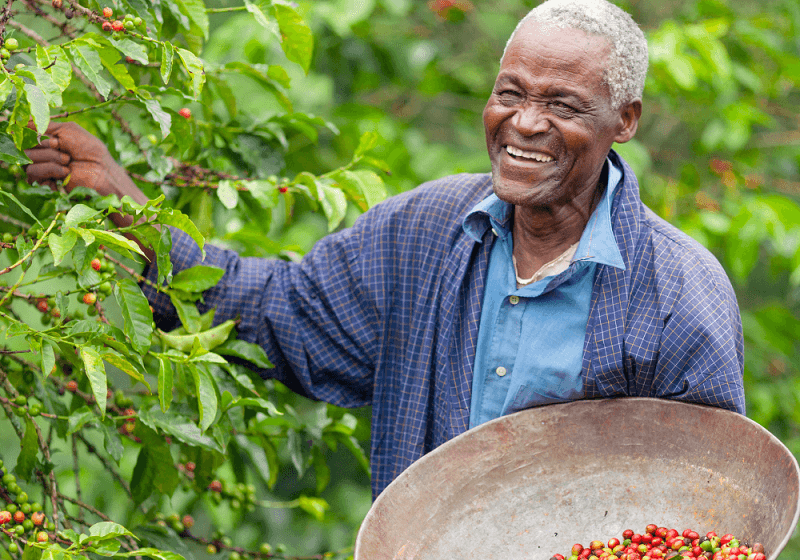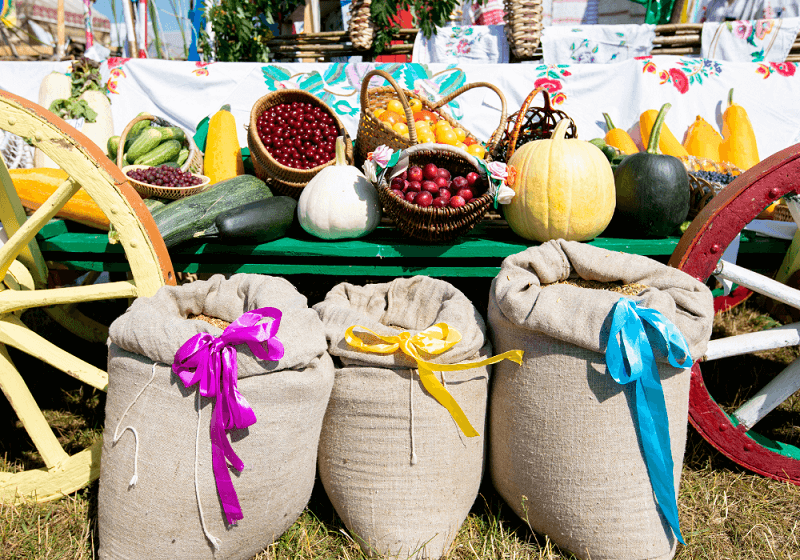The fair trade embodies an innovative approach and an alternative to global trade. It is a concept of modern society, aiming to rebalance the inherent inequalities in international trade. But why has this trade become a very important topic in our interconnected world? And what does it really mean ?
In this article, we will explore the true definition of fair trade, its fundamental principles, regulations, and legislative history in France. Finally, we will discuss the reasons why Biovie supports fair trade.
What is fair trade ?
Fair trade is a business model whose main objective is to ensure appropriate working conditions and better incomes for producers, particularly those in developing countries. It is based on principles of fairness, transparency, and sustainability. Having some disadvantages but several advantages, Fair trade seeks to find a balance between the interests of producers, consumers, and the planet. Producers in poor countries are the primary beneficiaries as this trade ensures them a fairer income and improves their standard of living. Consumers, in turn, can make more informed choices and support fairer and more respectful business practices throughout the entire production chain, as well as towards people.
Fair trade addresses global economic inequalities by promoting a more ethical and sustainable business model, while also encouraging environmentally friendly business practices.

What are the principles and values of fair trade ?
What makes fair trade a more just and ethical trading system are its 10 fundamental principles established by the WFTO (World Fair Trade Organization), which are:
- Opportunities for economically disadvantaged producers: Fair trade aims to create opportunities for marginalized producers, particularly those in developing countries, to improve their standard of living and achieve financial self-sufficiency, while providing them with fair access to global markets.
- Transparency: Transparency allows consumers to track the origin of products and ensure that fair standards are met. As a result, they are aware of the traceability of their products.
- Fair business practices: Fair trade promotes fair business practices, such as setting fair prices, building trust in business relationships, respecting payment deadlines, and reducing unnecessary costs in the supply chain.
- Fair price: Fair trade must guarantee producers a price that at least covers their production costs to ensure them a fair wage, which will allow them to live decently. This price is generally negotiated with the producers to ensure that it is fair.
- No child labor or forced labor: Fair trade organizations commit to respecting human rights by ensuring that there is no forced labor among their members, prohibiting child labor, and adhering to the United Nations Convention on the Rights of the Child.
- Gender equality and commitment to non-discrimination: Discrimination is not accepted in hiring practices within fair trade; it promotes gender equality and encourages the active participation of women in production and decision-making processes, to ensure their economic empowerment on the same level as men.
- Decent working conditions: Fair trade must ensure good working conditions, whether for producers or their employees. These good conditions include reasonable working hours, a safe working environment, and the freedom of association.
- Development capacity: Fair trade aims to strengthen the capacity of producers and workers by offering them training opportunities with the goal of improving their market position and contributing to the development of their communities.
- Promotion of fair trade: Fair trade organizations encourage buyers to promote this type of trade in order to raise awareness so that small producers can benefit even more from fair trade.
- Environmental sustainability: Fair trade encourages the practice of "green agriculture" which promotes respect for the environment. It will then be necessary to use environmentally friendly materials and reduce the use of pesticides and harmful chemicals.
These principles and values aim to create a balance between the interests of producers, consumers, and the planet, while promoting a more ethical and sustainable business model. They are governed by fair trade organizations that issue certifications to ensure compliance with these standards.
What are the different fair trade labels ?
The fair trade label allows consumers to identify the origin of products from sources that adhere to fair trade standards. Here are some of the most internationally recognized fair trade labels:
Fair Trade / Max Havelaar: It is one of the most widespread labels in the world and is awarded to products that meet international fair trade standards by the organizations Fair Trade International and Max Havelaar. Products bearing this label guarantee a fair price to producers, respect for dignified working conditions for its members, and promote transparency in supply chains. The Fair Trade / Max Havelaar label promotes environmental sustainability by encouraging environmentally friendly agricultural practices.
WFTO (World Fair Trade Organization): Rather than a specific label, the WFTO is a global organization that brings together businesses, artisans, and producers committed to fair trade. Members of the WFTO adhere to about ten principles that we have already mentioned above.
SPP (Small Producers' Symbol): The SPP is a label specifically focused on recognizing small producers. It is used for products coming from cooperatives of small producers and from developing countries around the world.
Fair for Life (Fair for Life): Established in 2006, this label issued by the Institute for Marketecology (IMO) focuses on fair trade and social and environmental sustainability. It is used for a variety of products, including agriculture, food, and cosmetics.
There are many other labels, each with its own criteria and specificities. This diversity reflects the global commitment to fair trade and the desire to address local challenges and needs while promoting fair and sustainable business practices.
What are the regulations for fair trade ?
Principles and general standards guide fair trade around the world. These standards are defined by international organizations such as Fair Trade International (FLO) and the World Fair Trade Organization (WFTO). Here are the main regulations and standards:
- Fair trade requires that producers receive a fair price for their products.
- Fair trade standards require decent working conditions such as reasonable working hours, the prohibition of child labor, workplace safety, and freedom of association.
- Organizations encourage transparency in business transactions.
- A portion of the sales from fair trade products is allocated as premiums to producer cooperatives for community development projects.
- This type of business promotes sustainable agricultural practices such as organic farming, environmental conservation, and responsible management of natural resources.
- Fair trade organizations encourage direct relationships between producers and buyers, which eliminates intermediaries who might exploit the producers.
- Fair trade aims to help producers in disadvantaged regions access international markets and expand their customer base.
- Several fair trade labels issue certifications to ensure that products meet their standards.

The legislative history of regulations in France
In France, the legislative history of fair trade is marked by a series of measures aimed at promoting its principles, defining certification criteria, and raising public awareness. Here is an overview of the most important points in the history of fair trade:
1960 - 1970: The first fair trade initiatives emerged in France during these years, driven by non-governmental organizations (NGOs) and international solidarity groups.
1989: The first "Fair Trade Festival" was organized in Paris to raise public awareness about fair trade.
1992: The Max Havelaar France association was created as a fair trade organization. It has played a central role in the development of fair trade in France.
1997: France has adopted the framework law on decentralized cooperation, which has promoted partnerships between French local authorities and communities in developing countries. This has created a favorable environment for the development of this trade.
2005: France has adopted a fair trade law that provides a legal definition and establishes criteria for recognizing products as fair trade.
2013 Sure, please provide the text you would like to have translated from French to English. France has adopted a law on the Social and Solidarity Economy, which recognizes fair trade as a component of the SSE and encourages its development.
2020 Of course! Please provide the text you would like me to translate. The law on combating waste and promoting a circular economy has been adopted. It introduced provisions to encourage repairable and durable products, which aligns with the principles of fair trade focused on sustainability.
2021 Sure, please provide the text you would like to have translated from French to English. Beyond the specific legislation on fair trade, France has continued to promote fair trade through awareness programs, information campaigns, and by encouraging the use of fair trade products in public institutions.
Why does Biovie advocate for fair trade ?
Biovie has been actively practicing fair trade since its inception. We hold human values deeply at our core. Improving the living conditions of producers, ensuring they receive a fair price for their work, promoting the development of our suppliers while respecting labor rights and equality, is a social responsibility we have been committed to since 2007. We engage in ethical and beneficial business practices for everyone, particularly by guaranteeing fair prices and transparency in the sourcing of our products.
Environmentally friendly production must also be carried out with respect for human beings; for us, these two concepts are fundamental and inseparable.
Transparency is a guarantee of quality for Biovie.





